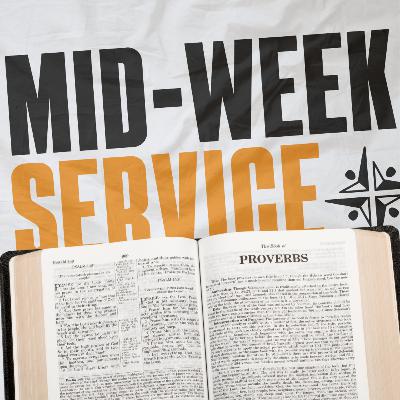Discover This Excellent Church - TEC
This Excellent Church - TEC

This Excellent Church - TEC
Author: This Excellent Church
Subscribed: 8Played: 74Subscribe
Share
© This Excellent Church
Description
We are an evangelical, reformed and charismatic church that affirms that salvation is by grace alone, through faith alone, in Christ alone, as revealed by scripture alone to the glory of God alone.
Our Mission
To reshape men’s values and reconcile them back to God
Our core values are - Love, Faith, Purity, Scholarship and Beauty.
Our Mission
To reshape men’s values and reconcile them back to God
Our core values are - Love, Faith, Purity, Scholarship and Beauty.
465 Episodes
Reverse
Love & Light 02 | Walk in the Light | 1 John 1:5-2:6Continuing the series on John’s letters, Pastor Seye explained that God is the Father of light and in Him is no darkness. He is the perfect light and does not change in degree of brightness. He is just, loving, and true, with no injustice, hatred, or inconsistency. As the source of all light, He remains unchanging in His perfection. John calls us to fellowship with this Christ so revealed, aligning with His desires. Hence, if we fellowship with Him, we cannot walk in darkness. Walking in darkness is not the absence of sin, but the embrace of sin. Those who fellowship with Him cannot embrace a lifestyle of sin, though they may stumble. In walking in the light, the blood of Jesus is available to cleanse us from subsequent sins, the basis on which we are being sanctified. We participate in the sanctifying work of the blood by confessing our sins. Though forgiven, we can still face restorative judgment to keep us from being condemned with the world. Confessing our sins and asking for forgiveness acknowledges our forgiveness, not denies it.Walking in the light means pursuing obedience, where sin becomes an occasional “if,” not an inevitable “when.” John’s core message is to walk as Christ walked, pursuing holiness and sanctification. Confessing sins is not a license to sin but a call to live in obedience, reflecting Christ’s light in our lives.
Be Anxious for Nothing | Dara Ewetola | Matthew 6:25-33
Love & Light 01 | Fellowship with the True Christ | 1 John 1:1-4Pastor Seye begins this new teaching series with an introduction, explaining the historical context of John’s letters.1 John was written to confront false teachings about the person of Christ that were spreading among believers. Some groups, such as the Ebionites, denied His divinity, while others, like the Docetists, denied His true humanity. John wrote to correct these errors and affirm that Jesus is both truly God and truly Man.The Docetists claimed that Christ only appeared to be human but was not truly flesh and blood. They believed that a being from the kingdom of light could not take part in material or earthly things. John counters this by declaring that the eternal Word of life, who existed from the beginning, was seen, heard, and touched by the apostles. In doing so, he establishes both the deity and humanity of Christ.Denying Christ’s real humanity has serious implications for our salvation, because only the true, incarnate Son of God could shed His blood for our sins. False doctrines corrupt the hearts of believers and lead them away from the truth, but sound doctrine strengthens our fellowship with God and produces fruits that align with His will.
Figs in the Vineyard Kingsley | Luke 13:1-9
Learning From the Corinthians (Part 26) | 1 Cor. 14:19-40The gift of tongues is regarded as superior and essential in certain Christian circles. However, this position stands in contrast to Paul's actual teaching.Paul urges the church to especially desire the gift of prophecy because it builds up the entire church, including the one who prophesies — unlike uninterpreted tongues, which only build up the speaker because nobody else understands what is being said.While the gift of tongues does exist today, God never intended it to be our primary means of prayer and personal edification. This is because all spiritual gifts are given for the common good of the body of the Christ.Instead, He calls us to:1) Pray in our understanding, as enabled by the Holy Spirit who dwells within us — which is the true meaning of "praying in the Spirit".2) Be filled with His Word, remaining steadfast in the truths we have been taught.
If we are to desire the higher gifts, prophecy like Apostle Paul describes in 1 Cor 14, what then is prophecy and the role of prophets in the church
Learning From the Corinthians (Part 25) | 1 Cor. 14:1-19The gift of tongues is regarded as superior and essential in certain Christian circles. However, this position stands in contrast to Paul's actual teaching.Paul urges the church to especially desire the gift of prophecy because it builds up the entire church, including the one who prophesies — unlike uninterpreted tongues, which only build up the speaker because nobody else understands what is being said.While the gift of tongues does exist today, God never intended it to be our primary means of prayer and personal edification. This is because all spiritual gifts are given for the common good of the body of the Christ.Instead, He calls us to:1) Pray in our understanding, as enabled by the Holy Spirit who dwells within us — which is the true meaning of "praying in the Spirit".2) Be filled with His Word, remaining steadfast in the truths we have been taught.
Does the bible teach that man is tripartite in nature?
Learning from the Corinthians (Part 24) 1 Corinthians 12:31 – 13:13In this sermon, Pastor Sam emphasised that the essence of the gifts of the Spirit is to express love for our brothers and sisters in Christ. Paul highlights a hierarchy among the gifts and introduces a superior approach: love. He explains that speaking in angelic tongues, wielding prophetic powers and insights, or showing extreme generosity, even to the point of martyrdom, is meaningless without love. Such acts, devoid of love, are mere noise, amount to nothing, and yield no reward. The true purpose of these gifts is to serve and love God’s people.Love reflects the attitude that Christ has toward the church, seeking the good of others regardless of personal cost. This love originates from God, and apart from Him, it does not exist. Without God, man cannot love, for God is love. Just as God loved us without waiting for our actions, our love must be proactive. The gifts God grants us will be judged based on how we use them for the benefit of others, not for personal gain or selfish ambition.Paul further describes love as patient, kind, trusting, hopeful, and enduring, while free from envy, boastfulness, arrogance, resentment, or delight in evil. In essence, love seeks the well-being of others, not their harm or pleasure.God embodies love, and love is eternal. While other gifts will eventually lose their purpose, love will endure forever. The ultimate goal is to be with God, where love will remain supreme. Until then, the church should be a foretaste of heaven by loving one another as Christ loved us. Paul concludes that while faith, hope, and love endure, love is the greatest, as our faith and hope stem from God’s love for us.
On this scholarship Wednesday, Mohammed Sule briefly explores the receOn this scholarship Wednesday, Mohammed Sule briefly explores the reception of the spiritual gifts in the historic church. He gives a comprehensive summary of how the spiritual gifts have been recognized and utilized in the Pentecostal church. He focuses on the early organization and belief of the classic Pentecostal Church about the spiritual gifts.
Learning from the Corinthians (Part 23) | 1 Corinthians 12In this sermon, PSam reminds us not to go beyond what is written, just as Paul had earlier instructed. Paul clarifies certain words so they are not read through pagan lenses, showing that spiritual gifts are freely given, administered by God’s sovereignty, and meant for the edification of the church.The gifts are not for display or self-importance but to glorify Christ and draw men to Him. Though diverse in form, all gifts are gracious and empowered by the same God.Paul stresses that the gifts are for the common good, modelled after Christ’s service to the church. This common good means being conformed to Christ’s image and walking in the good works God prepared for us, which is simply godliness lived out.It is God who works these gifts in us as we serve the church. Paul makes no hierarchy among gifts, whether miraculous or ordinary by our standards. Each comes from the same Spirit and is vital to the body, with even the less visible parts given great honor in God’s design.
On this scholarship Wednesday, Mohammed Sule briefly explores the reception of the spiritual gifts in the historic church. He gives a comprehensive summary of how the spiritual gifts have been recognized and utilized in the historic church from the Ante-Nicene Fathers down to the Reformation
James 4:1-3In this charge, Samuel Oyeyinka reminds us about the beauty and power of prayer.He also addresses what effective prayer is and how we can pray effectively.Finally, he addresses two things that hold people back from praying – complacency and giving up
Learning From the Corinthians (Part 22) | 1 Cor. 10:14–33; 11:2–16In this sermon, Pastor Sam shows how Paul addresses two vital issues in the Corinthian church: fleeing idolatry and honoring God’s order in worship.Idolatry is the root sin that rivals God for our devotion. In Corinth, eating food sacrificed to idols was more than a meal — it was participation in idol worship. Some believers knew the food meant nothing, but others believed it tied them back to false gods. Out of love, Paul warns: don’t do it. You cannot partake of the Lord’s Table and the table of demons. To rob God of His glory or cause a brother to stumble is to take lightly the very cross of Christ.Paul then turns to head coverings in worship. For a man to cover his head in their cultural context was seen as dishonor, and for a woman to uncover hers was equally dishonor. While the cultural symbol was hair in the ancient world, the principle reaches deeper: God has woven order into creation. Man and woman are equal before God but distinct in role and design. To ignore these distinctions is to dishonor God’s wisdom.The heart of it is this: the Christian life is not about fighting for our personal rights, but about laying them down for the sake of others and for the glory of God.
This Excellent Church – Belgic Confession, Article 37: The Last JudgmentKey Texts: Matthew 25:31–46; Revelation 20:11–15; 2 Corinthians 5:10Description:In this powerful conclusion to the Belgic Confession series, Pastor Samuel Oyeyinka expounds Article 37 on the Last Judgment. This sermon calls believers to live with urgency, hope, and holiness in light of Christ’s return.The message highlights:The certainty of Christ’s second coming to judge the living and the deadThe resurrection of both the righteous and the wickedThe joy of believers who will inherit eternal life, and the terror of those who reject ChristThe justice and mercy of God displayed in final judgmentA call to readiness: living faithfully now because “we must all appear before the judgment seat of Christ” (2 Cor. 5:10)This is both a sobering and comforting message: sobering because it confronts us with eternity, and comforting because it assures us that Christ will make all things right. It ends with a hopeful reminder that for believers, judgment is not condemnation but vindication and everlasting joy with Christ.
YouTube description:Learning From the Corinthians (Part 21) | 1 Cor. 10:6-22In this sermon, Samuel Oyeyinka sheds light on two more practices that can make Christians fall away and miss their final rest, like ancient Israel: (1) Sexual immorality: Enjoying the privilege of sexual pleasure without the corresponding responsibilities of a marriage vow.(2) Grumbling / Testing God: Challenging God to satisfy our desires because we've grown discontent with His good gifts.Although the danger of falling away is real, Christ promises to keep His own to the end (John 6:35-40). Our role is to take the way of escape He graciously provides whenever temptation comes.
This Excellent Church – Belgic Confession, Article 36: The MagistratesKey Texts: Romans 13:1–7; 1 Peter 2:13–17Description:What is the role of the state, and how should Christians respond to civil authority? In this sermon on Article 36, Pastor Samuel Oyeyinka explores the biblical doctrine of civil government. Far from being a human invention, government is established by God to maintain order, promote justice, and restrain evil.Key themes include:God’s sovereignty in appointing rulers and governments (Romans 13:1)The proper relationship between church and state—distinct but complementary rolesThe believer’s duty to honor, pray for, and obey civil authorities, unless commanded to sinWarnings against both anarchism and idolatry of political powerHow Christians can live as good citizens while maintaining ultimate loyalty to Christ the KingThis sermon equips believers to navigate politics and society with a gospel-centered perspective, seeing government as part of God’s providential care while remembering that our true citizenship is in heaven (Philippians 3:20).
Learning From the Corinthians (Part 20) | 1 Cor. 9:24–10:7The reward ahead of believers — everlasting life with God — far surpasses anything this world can offer. This eternal hope should spur us to exercise self-control and guard against desires that destroy the soul. The first of these destructive desires is idolatry: trusting created things to meet our needs instead of God the Creator, and treasuring the gifts above the Giver.How can we be free from idols? By exposing ourselves to God's means of grace — the Word, prayer, and the Sacraments — which He uses to change our appetites and transform our hearts.
Belgic Confession, Article 35: The Lord’s SupperMatthew 26:26–29; John 6:53–58; 1 Corinthians 11:23–29Description:In this teaching on Article 35 of the Belgic Confession, Samuel Oyeyinka unpacks the profound mystery and meaning of the Lord’s Supper. More than a symbolic ritual, the Supper is a spiritual feast where believers are nourished by Christ Himself.This sermon emphasizes:The true spiritual presence of Christ in the Supper, not just a memorial actThe Supper as a means of grace where believers receive Christ by faithThe necessity of self-examination before partaking, guarding against unworthy participation (1 Cor. 11)The Supper as a sign and seal of our union with Christ and one another in the churchThe contrast between Christ’s once-for-all sacrifice and the Roman Catholic MassListeners are reminded that the Lord’s Table is where heaven meets earth—where Christ feeds His people and strengthens them for the journey of faith
Learning From the Corinthians (Part 19) | 1 Cor. 9:15-27God doesn't owe Christians praise or thanks for doing what He has commanded, whether that's preaching the gospel or working in church. Instead, we owe Him everything for saving us from eternal damnation and giving us eternal life. This truth should motivate the joyful and steadfast performance of our duty.Yet, God has promised an eternal reward for those who serve him faithfully — and that's the greatest ambition we can pursue.









👏👏👏